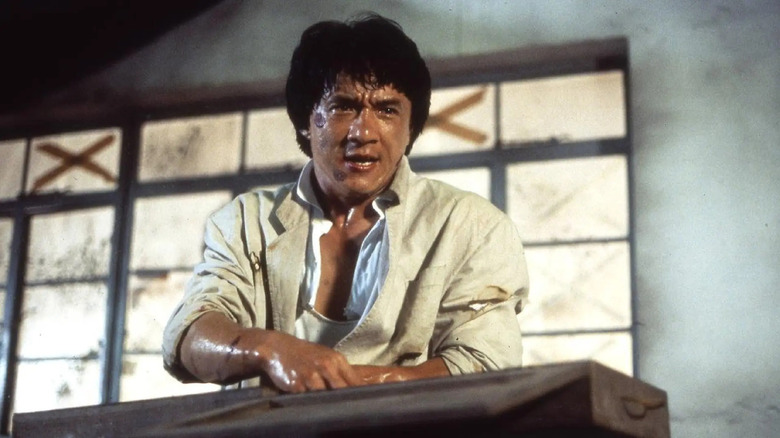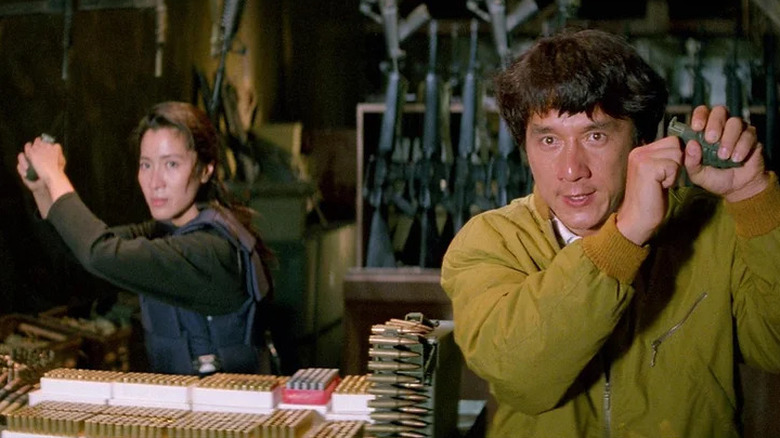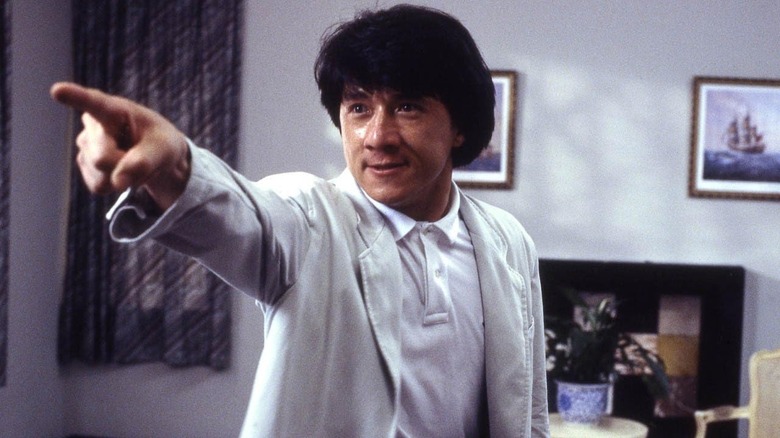The Correct Order To Watch Jackie Chan's Police Story Franchise
The story goes thus: it was 1985, and Hong Kong superstar Jackie Chan, having enjoyed nearly two decades of cinematic success in his native country, wanted to extend his reach into the United States. Chan had already tried to infiltrate America in 1980 with Robert Clouse's film "The Big Brawl," but while it was highly respected by martial arts fans, "Brawl" wasn't the massive hit Chan wanted. Chan had already directed four movies by 1985 but still felt that an American director could translate his fightin' sensibilities for a North American audience more accurately. So, he hired genre filmmaker James Glickenhaus ("The Astrologer," "The Exterminator") to helm the 1985 actioner "The Protector."
Chan and Glickenhaus butted heads throughout production, as Glickenhaus refused to film fight sequences in a way Chan approved of. At the end of production, Chan merely re-edited the film himself and directed new scenes in the hope of salvaging the project.
It was his distaste of "The Protector" that led Chan to make the first "Police Story," his fifth directorial effort, in which he played a supercop named Kevin Chan Ka-Kui. It just so happens to be one of Chan's best and spawned a long series of sequels that were huge hits in Hong Kong and well-received Stateside.
Keeping track of all the "Police Story" sequels may be difficult for American readers as they were released sporadically — and with altered titles — in North America. The 1996 film "Supercop," for instance, is actually the 1992 film "Police Story 3: Supercop."
These films are best appreciated in the order in which they were released. To clarify things, the below list will catalog all the "Police Story" films in order, listed alongside their American titles and release dates.
Watch the Police Story films in their release order
Here are the "Police Story" films in order of their release. Because of the way Hong Kong action cinema was so roughly handled in international markets, many of the below titles will have notes as to how they were recut and retitled:
- "Police Story" (1985) — Cut by 13 minutes and released as "Jackie Chan's Police Force" on American home video in the '80s. Not released in its complete form in North America in 1998, presented with a new musical score.
- "Police Story 2" (1988) — The Hong Kong version is 105 minutes, the Japanese cut runs 122 minutes, and the American cut runs 95 minutes. The 105-minute version was released in the U.S. in 1999 and was presented with a new musical score.
- "Police Story 3: Supercop" (1992) — Released theatrically as "Supercop" (1996) in North America, cut down by 10 minutes and re-scored. The North American version also had new pop songs.
- "Supercop 2" (1993) — A spinoff starring Michelle Yeoh, sometimes called "Project S." Released in the United States on DVD in 1999.
-
"Police Story 4: First Strike" (1996) — Released theatrically in the U.S. as "Jackie Chan's First Strike," rescored and sans 20 minutes.
- "New Police Story" (2004) — Released on DVD in the U.S. in 2006. Minimal cuts were made.
- "Police Story 2013" (2013) — Released on DVD in the U.S. in 2015 as "Police Story: Lockdown."
In the heyday of 1970s grindhouse cinema, it wasn't uncommon for fly-by-night American studios to purchase martial arts movies, cut them down considerably, and retitle them with impunity. Indeed, some martial arts films would be released under several alternate titles and released multiple times, hoping to trick audiences into thinking they were new.
Hollywood did Police Story dirty
Then, just to keep the cycle going, those same American studios would edit multiple films together into a new, nonsensical hybrid. The new amalgam movie would then be released under yet another alternate title. Having done it, I can say that archiving 1970s prints of Chinese and Hong Kong action movies is a frustrating affair and requires a lot of research and familiarity with the genre and its filmmakers.
Hong Kong cinema experienced an American boom in the 1990s, largely thanks to a bolstering by Quentin Tarantino. In 1995, Jackie Chan finally caused ripples in the U.S. with the release of Stanley Tong's "Rumble in the Bronx," establishing him as an international star. This caused a glut of "remixed" imports throughout the 1990s, many of them from the "Police Story" series as listed above. The 1997 film "Operation Condor," to cite another example, was the 1991 film "Armor of the Gods II: Operation Condor." It was presented to American audiences without context.
Despite the new attention Chan was receiving in the U.S., a lot of the clumsy handling of martial arts movies was still industry standard. American studios didn't seem willing to release Chan's movies unadulterated, including the "Police Story" films. It wouldn't be until boutique home video companies like Arrow Video and the Criterion Collection came along that Hong Kong actioners and Chinese wuxia films would be restored properly and given the star treatment.
Those who think Hong Kong action is "cheap" or "cheesy" were likely weaned on shortened, re-dubbed prints that were not cared for. In actuality, Chan's movies are vibrant, crisp, exciting, and some of the best action cinema you'll ever see.


